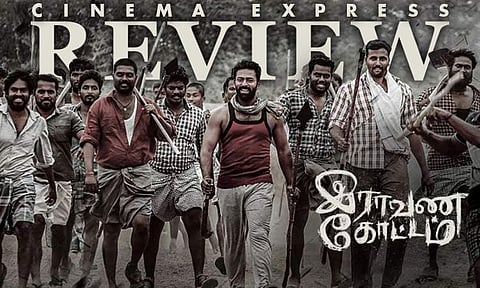Raavana Kottam Movie Review: An underwhelming take on caste and social issues
Rating:(2 / 5)
Vikram Sugumaran's Raavana Kottam opens with a shot of Prabhu's Bose meditating. The frame widens to reveal nine more heads hovering over his shoulders. Instead of resembling his image, these heads represent a staggering ensemble of national leaders with distinctive political ideologies ranging from Periyar, Ambedkar, Muthuramalinga Thevar to Abdul Kalam. It's clear that the director wants to show his version of Raavanan as an amalgamation of the fine qualities of the above leaders. But, halfway into the film, I began to rethink if the ten heads were a metaphor for the multiple ideas Vikram has crammed into his rural drama.
Cast: Shanthnu, Anandhi, Sanjay Sarvanan, Prabhu, Ilavarasu
Director: Vikram Sugumaran
In an attempt to be a lot of things all at once, Raavana Kottam ends up doing very little justice to each of the checkboxes it aspires to tick. It has a deceptive, unrequited love angle on the lines of Shahjahan (2001), and a friends-turned-foes angle like Anjathey (2008). If it was an ominous wall in Madras (2014), there is a central pillar in the village in Raavana Kottam. While these resemblances do act as a dampener, they are also tried-and-tested tropes that have the potential to be engaging cinema. But the film hardly offers anything refreshing in its narrative.
The major misstep of Ravaana Kottam is the sheer lack of depth in the characters, excluding Bose. None of the others seem to have a strong want in the film and neither do we fully understand who they are as individuals. Shanthnu's Senguttuvan is a charcoal burner by profession, but barring a few passing references we barely see him working. Even when Bose makes a decision that could possibly threaten his livelihood he doesn't bat an eye. Anandhi's Indira, on the other hand, falls for Senguttuvan because he is the first man to kiss her by force in public! You read that right. Instead of putting the man behind bars, she calls him her husband. Without showing us the organic evolution of the relationship between people, Vikram always opts for an explainer dialogue spelled out either by the narrator or the characters.
Raavana Kottam at its core tries to register that everybody is a nobody in front of a corrupt system and even the noblest souls can become pawns of the devil, without the right leadership. With such a strong crux the film could have been an engrossing dissection of the moral ambiguities of a youngster who is torn apart by pride and betrayal. But the film hardly focuses on Senguttuvan and his character arc. Even his crucial shift to the darker side at the crematorium, where he lets his caste pride and rage blind his morals and friendship is staged in the oddest and unassuming way possible. Within a couple of minutes, he goes from 'Madhi is my brother' to 'I challenge that low caste person for a duel'. This feels even more unsettling when we realise that Senguttuvan had just mourned the partition of his village over caste.
Though Raavana Kottam was projected to be a film that encourages equality and is just a representation of caste politics prevalent in rural Tamilnadu, it doesn't get the balance right. The fact that a star like Prabhu and a supporting actor like Ilavarasu were cast to play leaders of a dominant and oppressed caste, respectively, gives away the stance of the makers. The incessant Muthuramalinga Thevar references and the absolute absence of similar homages to Dalit leaders are icing on the cake. Despite the multiple 'ella jaadhiyum onnu dhaan ya' dialogues, the film slyly refrains from registering its views on inter-caste marriages.
With so many elements working against the film, the final nail in the coffin happens to be the unintentional humour in the last act. One of the antagonists makes a clumsy decision to jump into a burning furnace to dodge a bullet and a hot-headed cop gets mistakenly encountered by his own squad. Another policeman who loses the body of a casualty randomly shoots the first person he spots and shouts, "Sir innoru body kedachiduchu!" Of course, deaths aren't a matter of joke, but when the staging is this chaotic, it only ends up being dark humour.
Towards the end of the film, Senguttuvan realises that the situation has clearly gone out of hand and all he can possibly do is accept what is on offer. He takes a moment to process this and breaks into a loud roar out of disappointment. Unfortunately, this turned out to be the most relatable part of the film for me.

